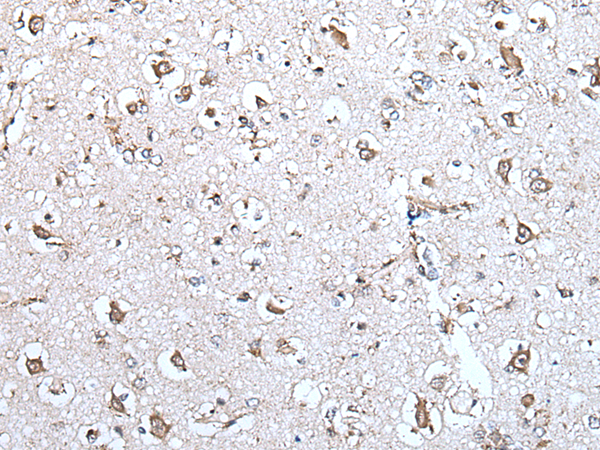
| WB | 咨询技术 | Human,Mouse,Rat |
| IF | 咨询技术 | Human,Mouse,Rat |
| IHC | 1/30-1/150 | Human,Mouse,Rat |
| ICC | 技术咨询 | Human,Mouse,Rat |
| FCM | 咨询技术 | Human,Mouse,Rat |
| Elisa | 1/5000-1/10000 | Human,Mouse,Rat |
| Aliases | CNA43; DNA43; PRO2249 |
| Host/Isotype | Rabbit IgG |
| Antibody Type | Primary antibody |
| Storage | Store at 4°C short term. Aliquot and store at -20°C long term. Avoid freeze/thaw cycles. |
| Species Reactivity | Human, Mouse |
| Immunogen | Fusion protein of human MCM10 |
| Formulation | Purified antibody in PBS with 0.05% sodium azide and 50% glycerol. |
+ +
以下是3篇涉及MCM10抗体的参考文献及其简要摘要:
1. **文献名称**:*MCM10 regulates DNA replication elongation by stimulating the CMG helicase*
**作者**:Alver, R.C., et al.
**摘要**:该研究利用MCM10特异性抗体进行免疫沉淀和蛋白质印迹分析,揭示MCM10通过激活CMG解旋酶复合体(CDC45-MCM-GINS)促进DNA复制叉的延伸,并维持基因组稳定性。
2. **文献名称**:*MCM10 overexpression indicates poor prognosis in hepatocellular carcinoma*
**作者**:Liang, Z., et al.
**摘要**:通过免疫组织化学(IHC)结合MCM10抗体,研究发现MCM10在肝癌组织中显著高表达,且与患者生存率低及肿瘤侵袭性相关,提示其作为肝癌预后标志物的潜力。
3. **文献名称**:*MCM10 interacts with PCNA and coordinates DNA replication with chromatin assembly*
**作者**:Watase, G.J., et al.
**摘要**:该研究利用MCM10抗体进行共聚焦显微镜和免疫共沉淀(Co-IP)实验,证明MCM10通过与PCNA相互作用,协调DNA复制与染色质组装过程,确保复制后核小体重建。
4. **文献名称**:*Cell cycle-dependent phosphorylation regulates MCM10 stability and replication initiation*
**作者**:Ryu, S., et al.
**摘要**:通过Western blot和免疫荧光技术(使用MCM10抗体),发现MCM10的磷酸化状态随细胞周期变化调控其稳定性,影响复制起始复合体的形成及复制起始效率。
这些文献均通过MCM10抗体探究其在DNA复制、癌症进展或细胞周期调控中的功能,涵盖分子机制与临床相关性研究。
MCM10 antibodies are essential tools for studying the role of MCM10. a conserved eukaryotic protein critical for DNA replication. MCM10 is a component of the minichromosome maintenance (MCM) family, which regulates replication initiation and elongation. Unlike the MCM2-7 helicase complex, MCM10 does not directly unwind DNA but acts as a scaffolding protein, facilitating the assembly and stability of replication machinery. It interacts with MCM2-7. DNA polymerase α, and other replisome components, ensuring proper replication fork progression and genome integrity. MCM10 is vital during the G1/S phase transition and S phase, where it supports origin licensing and replication timing control.
Antibodies targeting MCM10 are widely used in research to investigate its expression, localization, and interactions. They enable techniques like Western blotting, immunofluorescence, and chromatin immunoprecipitation (ChIP), helping to characterize MCM10's dynamic behavior during the cell cycle. Dysregulation of MCM10 is linked to replication stress, genomic instability, and diseases such as cancer, where its overexpression is observed in proliferating tumor cells. These antibodies also aid in exploring MCM10's potential as a biomarker for cell proliferation or therapeutic targeting. Researchers rely on high-specificity MCM10 antibodies to dissect its molecular mechanisms in replication fidelity and its broader implications in development and disease.
×